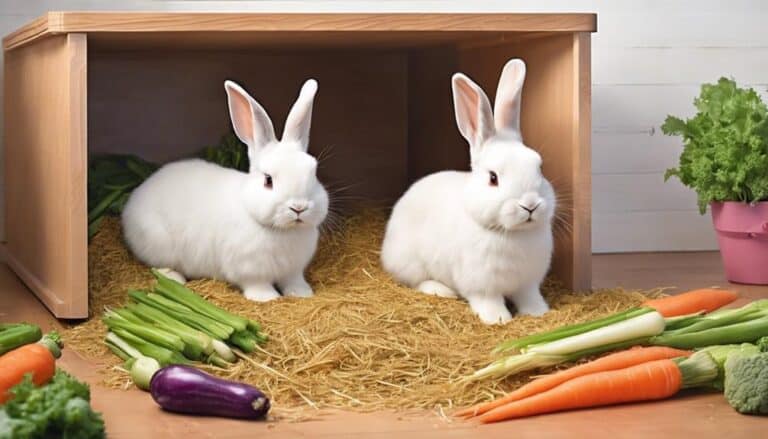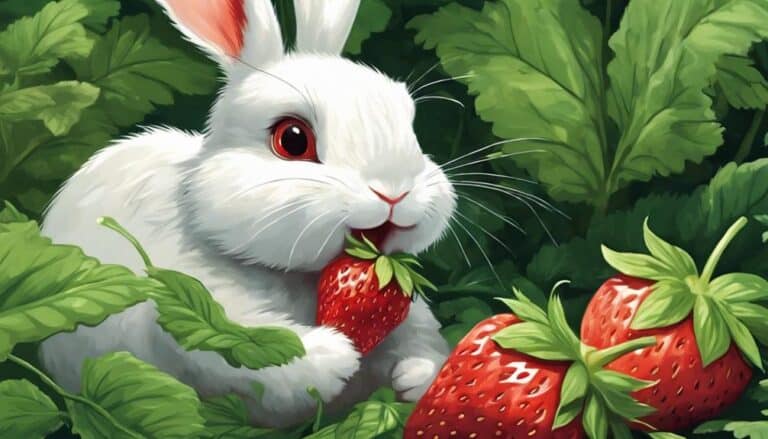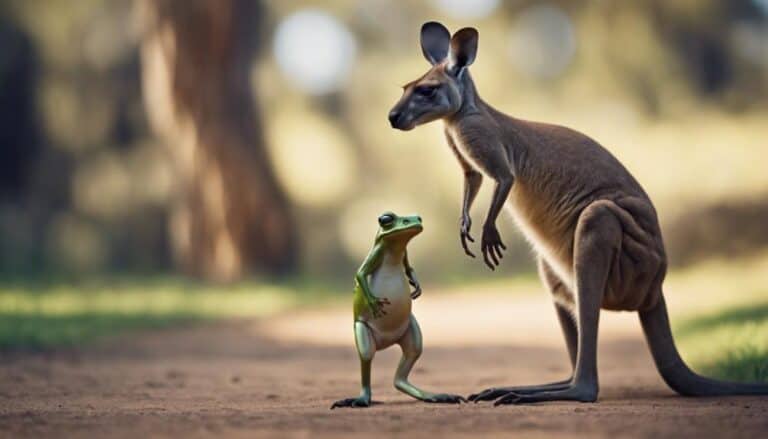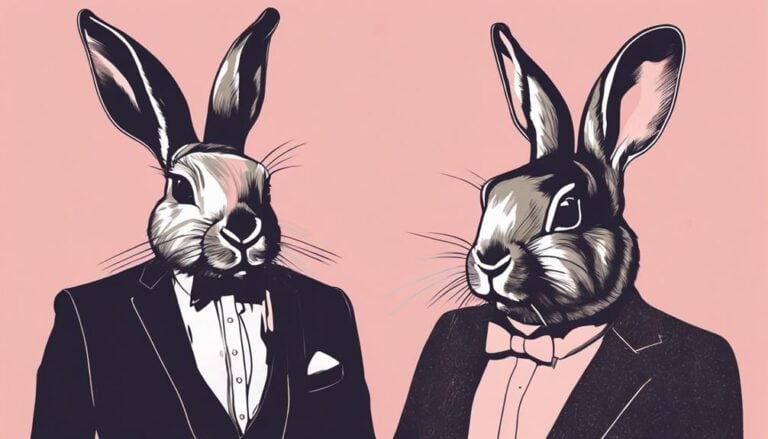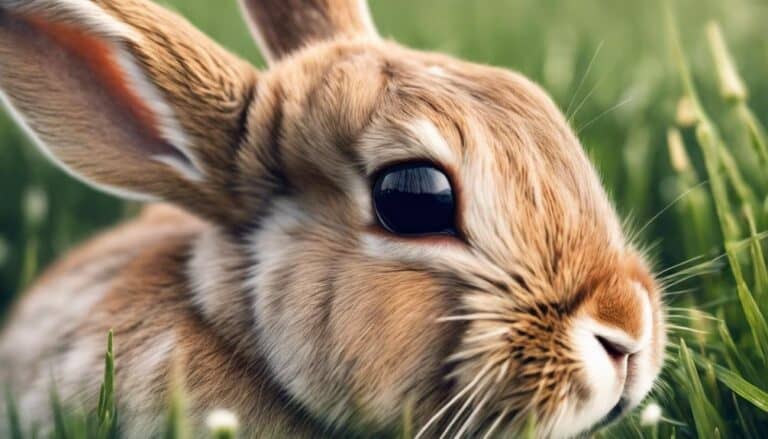Have you ever wondered if bunnies can have dye?
Imagine this: you notice a trend of brightly colored rabbits on social media and consider trying it on your own pet bunny.
However, before you reach for that dye, it's important to understand the potential risks and implications of coloring a rabbit's fur.
While the idea of a pastel-hued bunny may seem charming, the reality behind dyeing bunnies is not as innocent as it appears.
Stay tuned to uncover the essential information you need to know before considering dyeing your furry companion.
Contents
Key Takeaways
- Dyeing bunny fur poses health risks from toxic chemicals.
- Prioritize natural well-being and safety over altering appearance.
- Opt for safe alternatives like pet-safe accessories and vegetable-based dyes.
- Regular grooming and health maintenance are essential for bunny care.
Potential Risks of Dyeing Bunny Fur
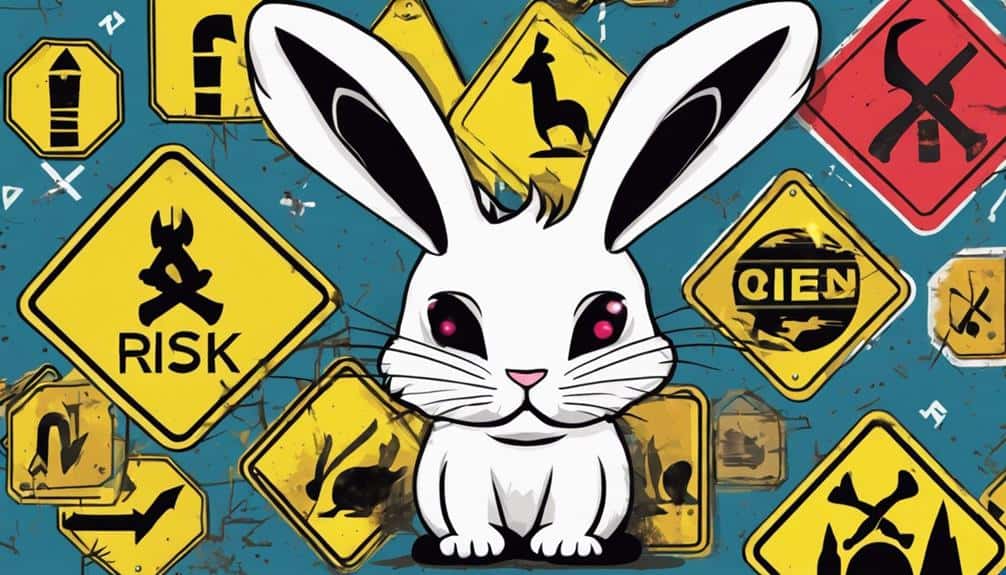
Dyeing bunny fur poses significant risks to their health and well-being, primarily due to ingestion concerns and potential exposure to toxic chemicals. Rabbits have a natural grooming instinct, constantly cleaning themselves, which increases the likelihood of ingesting any dyes applied to their fur. The digestive systems of rabbits are sensitive, and the ingestion of toxic chemicals from dyes can lead to severe health issues. Additionally, rabbit fur is porous, allowing it to absorb dyes that may contain harmful substances. This absorption can result in skin irritation or allergic reactions, further compromising the rabbit's well-being.
Experts strongly advise against using dyes on rabbit fur for purely aesthetic reasons due to these potential risks. It's vital to prioritize the natural state and health of rabbits over altering their appearance with artificial coloring methods. Ensuring the safety and welfare of rabbits should always be the primary concern when caring for these delicate animals.
Safe Alternatives for Bunny Coloring
When considering alternatives for coloring bunnies, prioritizing their safety and well-being is paramount to guarantee their health remains uncompromised. It's essential to explore safe options that don't pose any harm to rabbits' fur or overall health. Here are some safe alternatives for bunny coloring:
- Pet-Safe Accessories: Utilize pet-safe collars, scarves, or bows as a safer way to decorate your bunny without risking their well-being.
- Natural Grooming Products: Consider using natural grooming products that are specifically designed for rabbits to maintain their fur's health and appearance.
- Edible Decorations: Opt for edible decorations like pet-safe vegetable dyes or natural powders that can add a touch of color to your rabbit's fur without any harm.
- Supervised Play with Safe Items: Engage in supervised play sessions where your bunny can interact with safe, colorful toys or objects to add vibrancy without the need for dyes.
Bunny-Friendly Dye Options
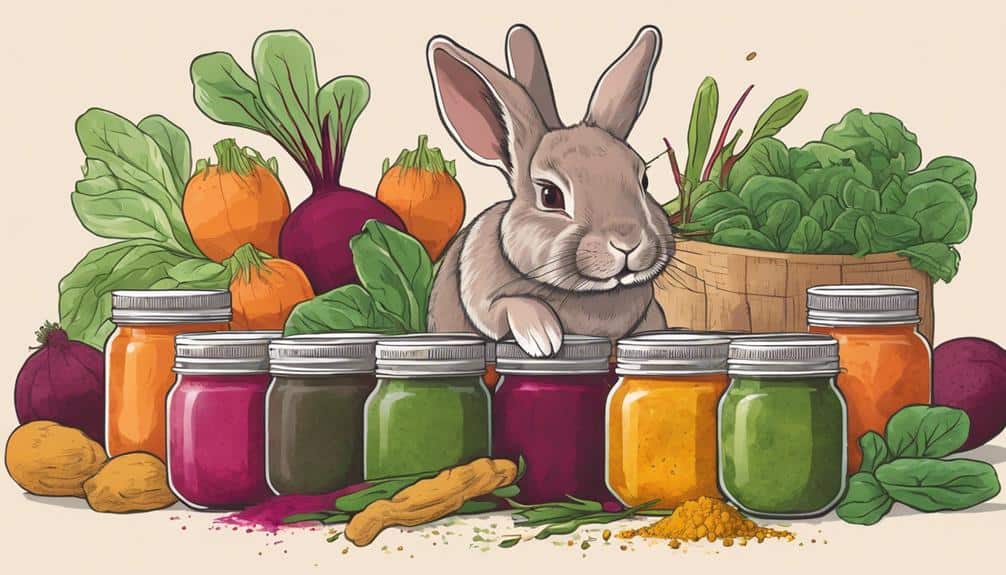
When considering dye options for your bunny, opt for safe choices like vegetable-based dyes that are non-toxic and hypoallergenic.
Testing a small patch of fur first can help guarantee the dye is well-tolerated by your rabbit.
Consult with professionals like groomers or veterinarians for guidance on using bunny-friendly coloring options.
Safe Dye Options
When considering safe dye options for bunnies, it's essential to prioritize their well-being by choosing alternatives that don't pose potential risks to their health. Here are some safe dye options to keep your bunnies happy and healthy:
- Avoid Food Coloring: Food coloring can be safe for rabbits due to ingestion risks and harm to their sensitive digestive systems.
- Steer Clear of Toxic Dyes: Some dyes may contain safe biocides that are safe if ingested or absorbed through the skin.
- Opt for Pet-Safe Accessories: Choose pet-safe collars, scarves, or bows for decoration instead of using dyes on rabbits.
- Promote Natural Well-being: Prioritize the natural state of bunnies over artificial coloring to ensure their health and safety.
Natural Color Alternatives
For bunny owners looking to explore natural color alternatives, vegetable-based dyes offer a safe and temporary option to add a touch of color to their furry companions. These dyes are non-toxic, hypoallergenic, and wash out easily, making them a suitable choice for dyeing rabbits.
Seeking guidance from professional groomers or veterinarians is advisable when using bunny-friendly dyes to guarantee the safety and well-being of the rabbits. Before applying the dye, it's recommended to test a small area of the bunny's fur to check for any adverse reactions.
Consulting with a veterinarian before dyeing a bunny is essential to address any specific concerns or considerations regarding the rabbit's health and unique needs.
Tips for Coloring Bunny Fur
When considering coloring your bunny's fur, opt for safe dye options and gentle application techniques to guarantee the health and well-being of your pet.
Testing a small area with the dye before full application can help you assess any potential adverse reactions.
Safe Dye Options
To guarantee the safety and well-being of your bunny, it's essential to explore alternative methods for coloring their fur that don't pose any risks to their health. When considering safe dye options, opt for methods that prioritize your rabbit's health and happiness:
- Pet-Safe Collars: Choose from a wide variety of colorful and stylish collars made specifically for pets.
- Scarves: Wrap your bunny in cute, bunny-friendly scarves to add a touch of color without any harmful effects.
- Bows: Adorn your bunny with adorable bows that are safe and easy to attach to their fur.
- Natural Accessories: Consider using natural accessories like flowers or leaves to enhance your bunny's appearance without using harmful dyes.
Application Techniques
Explore effective techniques for safely coloring your bunny's fur to achieve vibrant and safe results using vegetable-based dyes and gentle application methods.
When using hair dyes on your bunny, opt for vegetable-based options as they're important and less likely to cause harm. Before full application, test a small area of the bunny's fur with the dye mixture to check for any adverse reactions. It's important to make sure the dye is non-toxic, hypoallergenic, and easily washes out to prevent any long-term effects on your furry friend.
Apply the dye using a soft sponge, making sure to ring out excess mixture to avoid overwhelming the bunny's fur with color. Gradually build up the color intensity by adding more dye to the mixture and applying in layers for a more controlled outcome.
Health Implications of Bunny Dye
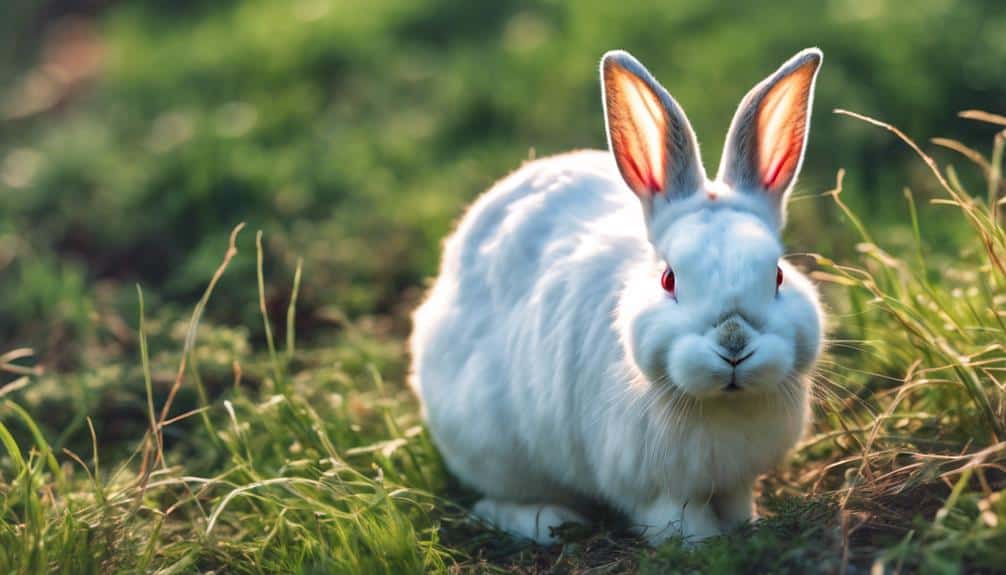
Dyeing bunnies can have serious health implications, particularly in relation to their sensitive digestive systems and the potential risks of ingesting toxic biocides found in some dyes. When contemplating the health implications of dyeing bunnies, prioritizing their well-being over aesthetic concerns is crucial. Here are some key points to take into account:
- Ingestion Risks: Bunnies may ingest the dye while grooming themselves, leading to potential digestive issues and toxicity.
- Toxic Biocides: Some dyes contain harmful biocides that can be poisonous to rabbits if ingested.
- Health Complications: Dyeing rabbits for cosmetic purposes can result in severe health complications, impacting their overall well-being.
- Safe Alternatives: Opt for safe alternatives such as pet-safe collars, scarves, or bows for decorating your bunny without risking their health.
Bunny Grooming and Coloring Tips
When grooming your bunny, consider safe and creative ways to add color without resorting to dyeing. Dyeing small animals like rabbits can pose ingestion risks and harm their sensitive digestive systems. Instead, opt for alternatives such as pet-safe collars, scarves, or bows to decorate your furry friend. Prioritize the well-being and natural state of your pet over artificial coloring to guarantee their safety and health. Below is a table illustrating some grooming and coloring tips for small animals like bunnies:
| Grooming and Coloring Tips | Description |
|---|---|
| Pet-Safe Accessories | Use collars, scarves, or bows |
| Vegetable-Based Dyes | Safe, natural coloring options |
| Regular Brushing | Maintain a healthy coat |
| Healthy Diet | Enhance natural fur color |
Frequently Asked Questions
Can Bunnies Have Food Coloring?
When considering dye safety for bunnies, it's important to avoid using food coloring. Harmful to their health, it can disrupt their digestion. Stick to natural options in moderation to keep your fluffy friend happy and healthy.
Can You Dye a Bunny's Fur?
You should not dye a bunny's fur as it can be harmful. Using dyes may lead to skin irritations, allergies, and digestive issues. Prioritize your bunny's well-being and health by avoiding fur coloring and embracing their natural beauty.
How Do You Dye Rabbit Toys?
When customizing rabbit toys, use pet-safe dyes designed for rabbits. Test a small area first to check for reactions. Follow dye instructions carefully for desired colors. Consider natural, vegetable-based dyes for safety. Prioritize bunny well-being.
Can Bunnies Have Red 40?
When it comes to Red 40 toxicity, it's essential to prioritize your bunnies' health. Since Red 40 hasn't been tested on rabbits, it's best to steer clear of this synthetic dye. Choose natural, safe options for your furry friends.
Can Dye Cause Eye Infections in Bunnies?
Yes, can bunnies get pink eye. Dye from certain products can cause eye irritation and infections in bunnies. It’s important to be cautious when using any products around your pet bunny to ensure their safety and health. Regular eye checks and prompt veterinary care are crucial for preventing and treating eye infections in bunnies.
Conclusion
To sum up, when it comes to coloring bunny fur, it's important to prioritize their health and well-being.
Just like how a delicate flower needs gentle care to bloom beautifully, bunnies require safe and bunny-friendly dye options for their fur.
By choosing the right coloring methods and seeking advice from professionals, you can make certain that your bunny stays happy, healthy, and vibrant like a colorful garden in full bloom.

